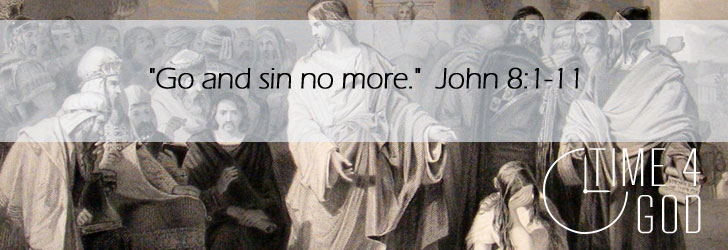Go and Sin No More
One of the great ways to enter into the Gospels is to imagine yourself as one of the characters involved in the story.

One of the great ways to enter into the Gospels is to imagine yourself as one of the characters involved in the story. The story of the adulterous woman is one of the most dramatic moments in the gospels and has many layers of meaning to it. The account that I am using here is from John 8: 1-11.
The setting for this event is very important. It takes place in the outer court of the Temple. Jesus had been out to the Mount of Olives where he had been praying through the night and, early in the morning, he had come back into Jerusalem and entered the Temple area where he began teaching to a crowd. Suddenly there is a commotion and a noisy crowd of people enter the area, pushing a frightened woman before them. The principle actors in this crowd are scribes and Pharisees who are intent on trapping Jesus in order to have reason to arrest him. They confront Jesus with a woman who we are told had been caught in the act of adultery. Their words are full of self-righteousness and superiority as they accuse her before Jesus and all the people there. They speak loudly so everyone can hear: ʺTeacher, (You can almost hear their sarcasm using this term) this woman was caught in the very act of committing adultery.ʺ Here you can begin to see their intent as they say, ʺNow in the law, Moses commanded us to stone such women. (They pause for effect and ask,) So what do you say?ʺ They hope that Jesus will say something that contradicts the law of Moses.
[content-ad]
But Jesus knows their minds. He quiets the whole buzzing crowd with a simple gesture; he bends down and starts writing with his finger in the dirt. The arrogant ones continue to ask their manipulative question loudly for the crowd to hear. Jesus rises and says very calmly, ʺLet the one among you who is without sin be the first to cast a stone at her.ʺ Then he bends and begins tracing something on the ground again.
Here is where it gets personal for me. How many times have I been like these scribes and Pharisees. Accusing another of some fault, real or imagined, out of the self-righteous arrogance of my own presumed superiority? When I ask myself this, my whole being burns with embarrassment and shame, for I am exposed to myself. I know that I am guilty of having done this more than once over the course of my life. If I was one of those scribes or Pharisees, I, too, would have skulked away without a word after Jesus’ challenge for a sinless one to throw the first stone.
There are a couple of important insights revealed in this story. First, God alone has the authority and the perfect innocence to judge another person’s soul. Second, Jesus is showing us the nature of that authority. For Jesus rises a second time from his scribblings in the sand and sees that the whole crowd has gone away and left only the accused woman and himself in that vast Temple area. ʺWoman, where are they? Has no one condemned you?ʺ We can imagined how stunned, grateful, and befuddled she must have felt at that moment. She replies, incredulously, ʺNo one, Sir.ʺ And Jesus reveals God’s nature and intent here, ʺNeither do I condemn you.ʺ
And here is the center of the message for all of us. He says to this woman, who has literally just escaped death by stoning, ʺGo, and from now on do not sin any more.ʺ It is as if Jesus has turned to each and every one of us, and is looking each of us directly in the eye saying to us, ʺGo, and sin no more.ʺ For, if truth be told, we are that adulterous woman. We are those scribes and Pharisees, for we are all sinners. What we see here, though, is that even though we are sinners, small and large, Jesus is telling us personally that even this does not stop his love for us. It shows us not only that, but that Jesus’ love is most manifest to us in his non-judgmental, unconditional forgiveness for us. He is the living Word that the prophet Ezekiel spoke about when he wrote: ʺI take no pleasure in the death of the wicked man, says the Lord, but rather in his conversion, that he may live.ʺ (Ezekiel 33:11)
Let us honor God’s unconditional love for us, by listening to his admonition to this adulterous woman. Let us turn to him in our sinfulness, bend our proud wills to him in the light of his humbling love and try our best to, ʺGo and sin no more.ʺ We know that we can count on his grace to aid us in this, for we have a God who is not interested in judging us arbitrarily, but who loves us enough to enter into our own suffering, to bear our sins on his own body on the cross, and to die for us, so that we might joyfully live with him forever in his kingdom. Thanks be to God.
SKM: below-content placeholderWhizzco for FHB

